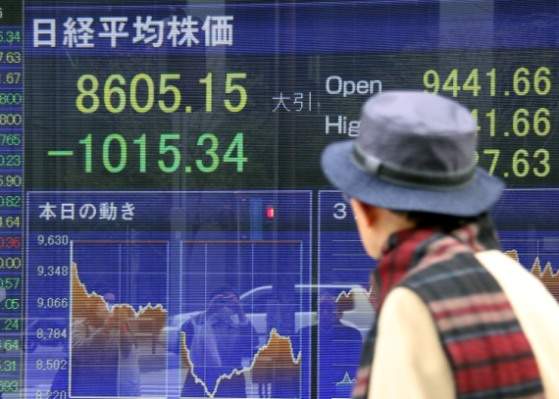Investors not bullish on Japan, but pour record amount of money into Nikkei anyway; 'oversold'
Foreign investors bought a record amount of Japanese stocks last week after the nation's equities markets tumbled in the wake of the March 11 earthquake and resulting nuclear accident.
Foreign investors bought 891 billion yen ($11 billion) in Japanese stocks in the week through March 18, the most since comparable records began in 2005, according to the Ministry of Finance in Tokyo. Looking at comparable data, this is “substantially the most on record,” said Yoshihito Hidaka, an official at the Ministry of Finance.
“For foreigners like us, the reason we bought Japan is mainly because investors overreacted and it was oversold,” said Alex Au, managing director in Hong Kong of Richland Capital Management Ltd., which oversees $300 million of assets. “That doesn't mean we're actually bullish on the outlook for Japan. We are just selectively buying stocks that were oversold and will benefit.”
The Nikkei 225 Stock Average tumbled 10 percent to 9,206.75 last week after the quake, tsunami and ongoing nuclear crisis raised concern Japan's economy will falter. The sell-off drove the average valuation of 1,666 shares listed on the Topix index to 0.91 times book value in the week, the lowest since March 16, 2009.
Cheap Stocks
“Foreigners are probably not necessarily bullish, but are thinking they can buy some cheap stocks at that moment,” said Richland's Au, who increased his exposure to Japanese stocks to 15 percent from between 5 percent and 10 percent before the quake. “I'm won't be surprised if the market bounces back to the pre-quake level as they unload their positions.”
Au bought shares that may benefit from rebuilding, including Komatsu Ltd. and Nippon Steel Corp., Japan's largest steelmaker, as well as Takeda Pharmaceutical Co. He said he sold Japanese financial stocks because of their risk amid increasing bad debt.
Foreign investors bought 955 billion yen more Japanese stocks than they sold last week, the most since March 2004, according to data from the Tokyo Stock Exchange today. Foreign institutional investors, who represent 70 percent of stock trading in Japan, were weekly net buyers of the nation's stocks from Oct. 29 through March 18, according to data compiled by Bloomberg. That's the longest streak since the 26 weeks through Dec. 9, 2005.
Japanese Investors
“Reactions from overseas I got through exchanging e-mails after the quake were surprisingly positive,” Tokyo Stock Exchange Group Inc. President Atsushi Saito said at a regular press briefing on March 22. Overseas investors had been net buyers of shares on the exchange during the March 14 and 15 rout, Saito said in a note on the bourse's website on March 15.
“The positive flow into Japanese stocks hasn't changed at its core,” said Manabu Tamaru, a senior investment manager at Baring Asset Management in Tokyo. “It's fair to have a positive view of valuations, with upside potential for cheap Japanese stocks.”
Separately, Japanese investors bought more foreign assets than they sold, showing that the yen's climb to a post World-War II high after the March 11 disaster wasn't driven by repatriation.
Purchases of foreign assets, including bonds and notes, exceeded sales by 291 billion yen from March 13-19, the Finance Ministry said in a report in Tokyo today.
Yen Buying
“Some Japanese people are saying they want to leave Japan and migrate to another country, as Japan is in an earthquake zone and not secure enough,” said Richland's Au. “If this is their mindset, at least they will prefer investing overseas than investing in Japan. They are little bit bearish on Japan's outlook because this type of quake can happen again.”
The report supports a case by Finance Minister Yoshihiko Noda and Economic Minister Kaoru Yosano that the yen rose to a record 76.25 against the dollar because of speculative trading, not demand for the yen from Japanese at home.
The International Monetary Fund yesterday said Group of Seven intervention for the first time in more than a decade was “appropriate.”
“This confirms the view that speculative trading played the major role for the yen to break a record last week,” said Taisuke Tanaka, chief currency strategist at Nomura Securities Co.
--Bloomberg News--







